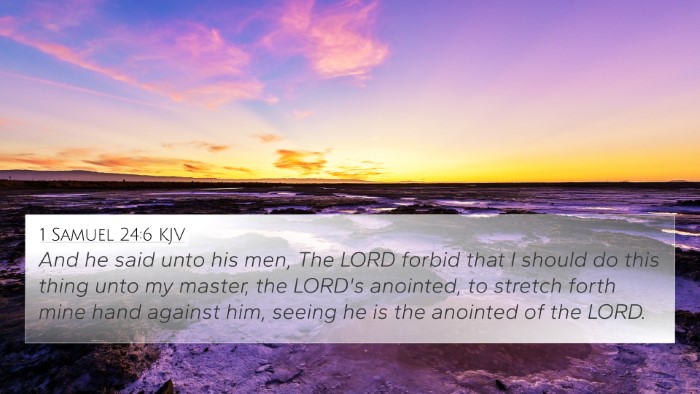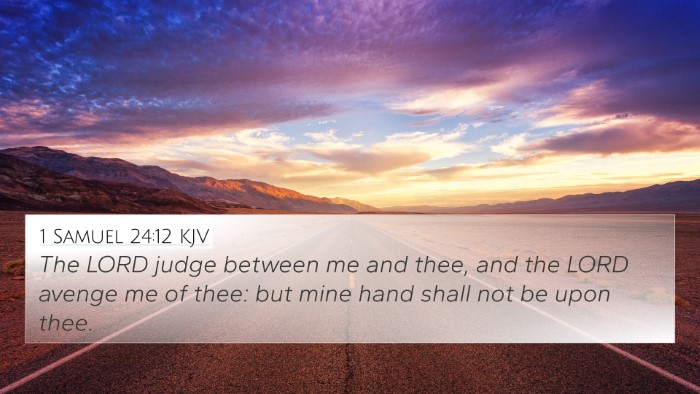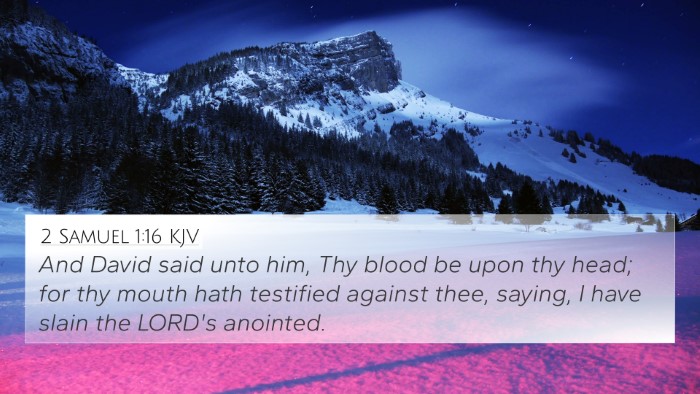Understanding 1 Samuel 26:11
Verse: 1 Samuel 26:11 - "The LORD forbid that I should stretch out my hand against the LORD’s anointed; but take now the spear and the jug of water that are by his head, and let us go."
General Interpretation
This verse is pivotal in illustrating the respect and reverence King David had for Saul, who was the anointed king of Israel despite Saul's pursuit of David's life. In this moment of opportunity, David chooses mercy over vengeance, showcasing a key theme of divine providence and human morality.
Insights from Public Domain Commentaries
Matthew Henry's Commentary
Matthew Henry emphasizes David's reluctance to harm Saul, reflecting a deep understanding of the sanctity of God's chosen leaders. He notes that David's integrity shines through, as he resists temptation even when he has the upper hand. Furthermore, Henry points out David's reliance on God's sovereignty and timing, which reinforces the importance of waiting for divine justice rather than taking matters into one’s own hands.
Albert Barnes' Notes on the Bible
Albert Barnes offers a detailed analysis of the implications of David's actions. He highlights that David’s refusal to kill Saul indicates his respect for God's appointment of Saul as king. Barnes explains that David's act of taking Saul's spear and jug symbolizes his ability to protect himself without resorting to murder. This act serves as a testament to David's character and his understanding of the significance of leadership ordained by God.
Adam Clarke's Commentary
Adam Clarke interprets this verse within the broader context of David's relationship with Saul. He notes that David sees killing Saul as an affront to God, which aligns with Clarke's interpretation of the overarching theme of divine authority in biblical leadership. Clarke also elaborates on the significance of mercy in contrast to prevailing notions of vengeance, presenting David as a model for righteous conduct in complex situations of conflict.
Thematic Connections and Cross-References
This verse can be cross-referenced with various other scriptures to deepen its understanding. Here are notable connections:
- 1 Samuel 24:6: David spares Saul's life in a similar encounter, emphasizing his respect for the anointed king.
- Romans 12:19: Aligns with the theme of leaving vengeance to God, suggesting a divine justice system.
- Psalms 105:15: A reminder to not touch God’s anointed, reinforcing the sanctity of God-chosen leaders.
- 1 Chronicles 16:22: Cautions against harming the prophets, reflecting respect towards those chosen by God.
- Matthew 5:39: Jesus teaches to turn the other cheek, paralleling David's choice of mercy.
- Proverbs 16:7: Illustrates that when one’s ways please the Lord, even enemies will be at peace, reflecting David’s predicament.
- Colossians 3:25: Explains that wrongdoing will be repaid, reinforcing David’s faith in God’s justice.
Conclusion
1 Samuel 26:11 serves as a powerful narrative that discusses themes of mercy, respect for God's chosen, and the morality of leadership. The highlighted commentaries and cross-references provide a richer context to the verse, encouraging deeper reflection on ethical living and divine authority among leaders.






